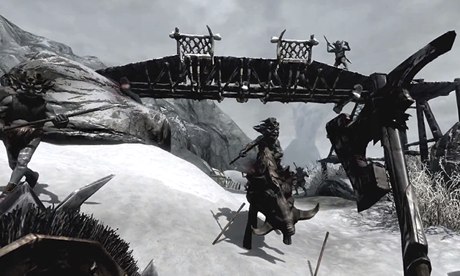
You walk into a village inn and it turns out the landlord sells swords. You're short of gold so you pop out and shoot some wolves with your bow and arrow. You add their pelts into the deal and buy the sword. Where's this? Skyrim, of course.
Skyrim is a computer game set in the mythical world of Tamriel, where human intercourse consists of fighting, stealing, magic and trade. Whether you're here, or in the deep space of EveOnline, or among the low-life in Grand Theft Auto V, the economics of computer games nearly always resemble early capitalism: trade, conquest and ruthless rule-bending are the sources of wealth; actual human labour and ingenuity almost never. With about half of all households owning a games console, and 8 million people a day secretly amassing fortunes on Facebook games like Farmville, that is one huge dollop of free-market ideology getting dumped into our leisure time.
But what happens if you try to subvert in-game economics? Players in complex online worlds are well used to "gaming the game" – that is, trying to exploit inconsistencies of the economic model to scam other players. Last year one player, by bidding up the price of a worthless object and then getting his friend to destroy it, almost wiped out all the value in the entire universe. The game's fulltime economists – such jobs exist – spent days unpicking the trades.
What I am proposing is something different. What if, just as in an Occupy camp, where they try to "live despite capitalism", you could live "despite" the property forms and voracious market economics of a computer game?
With Skyrim, the "modding" community – techies adept at creating unofficial versions of the game – have already done clever things with the economy of Tamriel. One limited the amount of natural resource (you can run out of wolves); another made the money supply finite; a third introduced a banking system, so that by saving your hoarded gold you could increase the supply of credit to other players.
But what if you could choose to play any of these games without trying to gain wealth through conquest, violence or the mercantile capitalist strategy of buying cheap and selling dear? What if you could pursue a strategy to create things collaboratively, outside the market, and give the basic necessities of life away for free? Would you be able, singly or in groups, to screw the slash-and-grab economy so badly that you forced it into a transition state beyond destructive competition?
These are good questions, because a whole school of economists thinks what they describe is the basic problem facing us in the real world.
Yochai Benkler, a Harvard law professor, has described how the rise of free stuff, collaborative production and non-commercial products such as Wikipedia, create a glitch within capitalism. In a networked information economy, he writes, "co-operative and co-ordinated action, carried out through radically distributed non-market mechanisms … plays a much greater role than it did". (Benkler Y, The Wealth of Networks, New Haven 2006).
Information goods undermine economic systems based on scarcity. Free, collaboratively made products, like Wikipedia potentially, kill commercial products in their market. Open source products – even when commercialised, like the Android system that runs on 70% of all new smartphones – can reduce the market share of closed, proprietary products.
If Benkler is right, the real-world economy of the 21st century becomes itself a giant game, in which non-market forms interact with the classic models based on scarcity and competition. Monopolies form but are undermined by the impossibility of enforcing property rights. Hierarchies soften, but cannot react effectively to the rise of networks.
In multi-player games there is already a lot of collaborative play, even inside the kill-and-shoot environments. Now designers have begun to respond overtly to demands for modelling collaboration: Journey (2012) is a wordless, ethereal game in which players, by interacting, produce mutual benefit and emotional connection but do not explicitly trade.
But most games remain trapped in the economics of their time: they are closed markets, with a variety of static business models, most of which involve destroying your opponent, monopolising designs, or plundering resources.
The challenge is to design a game where the economy can evolve: from competition to collaboration. Where instead of being a badass in LA, you can be a goodass on a communal farm in Andalusia. A game where the "modding" goes on within the official product, not through unauthorised experimental versions. A game where it's possible to "refuse" the basic Jungian call to adventure in an alien world and instead transform the world you live in.
For many of us, economic reality is already a mixture of the market and something beyond the market. Against this, the world of competitive plunder on which most computer and console games are based begins to look boring.
Next year, Skyrim itself goes multiplayer. Designers promise the mythical world of Tamriel will offer a choice of three warring alliances, nine ethnicities and unlimited face tattoos. The proposed economics look like a version of 18th-century mercantilism: conquer a castle, set up your trading post there, exploit need and scarcity.
As a fan of the game, I'd like the opportunity to do something radically different: #OccupyTamriel anyone?

